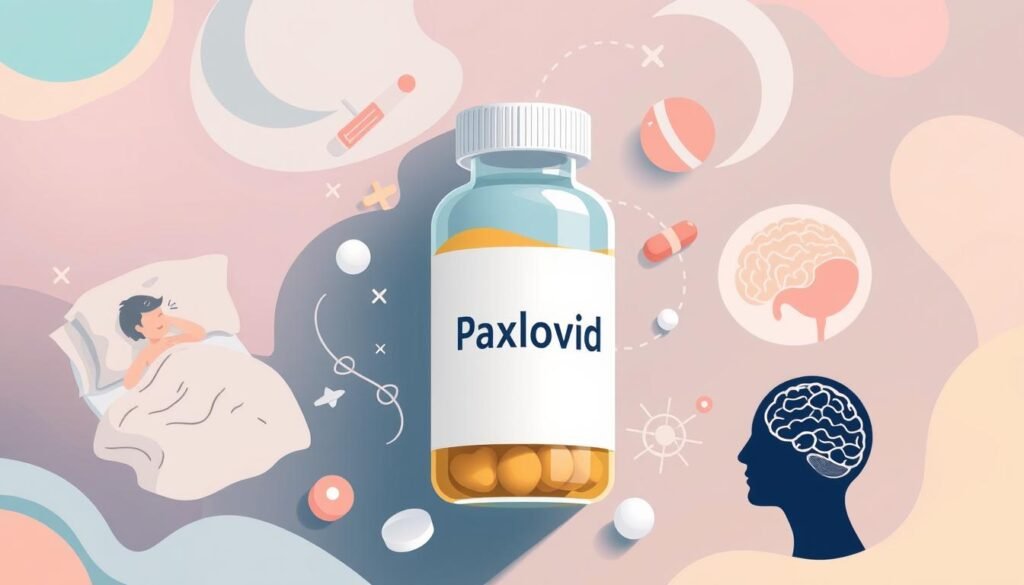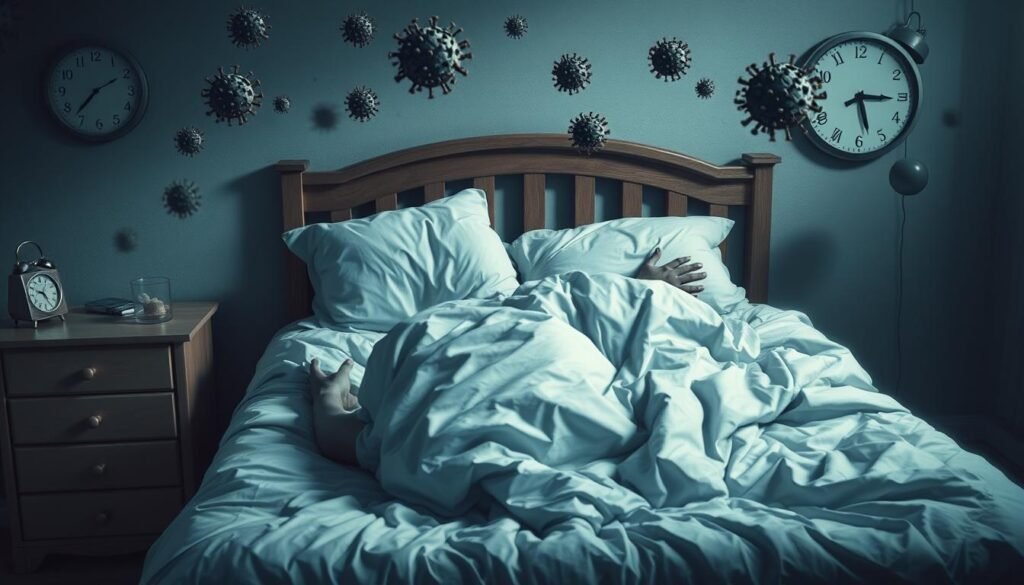A 5-day course of Paxlovid can reduce the risk of serious COVID-19 illness by 89% in unvaccinated adults. This innovative treatment is gaining attention for how effective it is. However, people are starting to talk about possible side effects, especially insomnia. Even though insomnia isn’t listed as a side effect in Paxlovid’s clinical trials, stories suggest it might disturb sleep. In this article, we look into research and personal stories to see how Paxlovid could make it hard for some people to sleep while fighting COVID-19.
Key Takeaways
- Paxlovid is authorized for individuals ages 12 and over at risk of serious COVID-19 illness.
- A 5-day course of Paxlovid reduces serious illness risk by 89%.
- There are anecdotal reports linking Paxlovid to insomnia and sleep disturbances.
- The most common side effects of Paxlovid include changes in taste, diarrhea, and headaches.
- Insomnia is not officially categorized as a side effect, but some patients report it.
- Consulting healthcare providers about side effects is crucial for safe medication use.
Understanding Paxlovid and its Use in COVID-19 Treatment
Paxlovid is a new oral drug fighting COVID-19. It’s for people 12 and older at high risk of serious illness. It works best if started within five days of feeling sick.
Using Paxlovid quickly can lower the need for hospital stays. Studies show it really helps in avoiding bad COVID-19 outcomes. It gives hope to those at greater risk.
Research proves Paxlovid helps in recovering faster from COVID. Patients see symptoms clear up quicker and shed the virus faster. It also cuts down on long-term COVID problems, proving its importance in treatment plans.
What is Paxlovid?
Paxlovid is a prescription drug for mild to moderate COVID-19 in high-risk patients. It targets the virus’s replication process in the body. This makes it key in managing COVID-19.
Components of Paxlovid: Nirmatrelvir and Ritonavir
Paxlovid’s power comes from two main ingredients: nirmatrelvir and ritonavir. Nirmatrelvir stops the virus from multiplying. At the same time, ritonavir keeps nirmatrelvir working longer. Together, they make Paxlovid effective against COVID-19.
Authorization and Eligibility for Use
Paxlovid is approved for emergency use by health authorities. It’s meant for those who have COVID-19 and could get very sick. Knowing if you can use it is important. Patients need to check if they fit the eligibility criteria. These include age and certain health issues that add to their risk.
Paxlovid Cause Insomnia: What the Research Says
Studies on Paxlovid have looked at its side effects. Initially, insomnia wasn’t seen as a side effect. But diarrhea, muscle aches, and nausea were noted. Still, the link between Paxlovid and sleep problems is being explored.
Clinical Trials and Reported Side Effects
Clinical trials confirm Paxlovid is safe. Yet, patients say it disrupts sleep. This might link to COVID-19’s impact on rest. Post COVID-19, many report sleep issues. A survey shows 76% of people had insomnia. This raises questions on Paxlovid’s effects and other health concerns.
Anecdotal Evidence of Sleep Disturbance
Since taking Paxlovid, some report trouble sleeping. They can’t fall or stay asleep well. This suggests a mix of viral effects, medication, and mental health issues. With insomnia tied to worse mental health, more research is needed on Paxlovid and sleep.
Potential Side Effects of Paxlovid

Paxlovid is an FDA-approved drug for fighting mild to moderate COVID-19 in people at high risk. Knowing its common side effects is key to use it safely. This is how we make sure the treatment does more good than harm.
Common Side Effects to Watch For
Some who take Paxlovid might notice:
- Altered taste
- Diarrhea
- Headache
- Nausea
- Stomach pain
Insomnia usually isn’t a big problem with Paxlovid. But it’s still smart to watch how you react to the drug. For tips on staying healthy while on Paxlovid, check out this link.
Understanding Severe Side Effects
The common side effects are generally mild. Yet, some may face serious issues, such as:
- Severe allergic reactions, like anaphylaxis
- Liver problems, seen as dark pee or yellow skin
- Bad skin reactions, like Stevens-Johnson syndrome
If you have these severe side effects, get help right away. Always be watchful when taking Paxlovid to stay safe.
Factors Contributing to Sleep Disturbance While Taking Paxlovid
Sleep disturbances linked to Paxlovid involve several factors contributing to sleep disturbance. The medication’s side effects, including muscle pain and diarrhea, can interrupt sleep. Additionally, lingering COVID-19 symptoms like fever and cough negatively affect sleep quality.
Those recovering from COVID-19 may face insomnia, especially long-haulers dealing with symptoms for months. Studies find that around 80% of mild cases see improvements within two weeks. However, some continue to struggle with sleep issues long after recovery.
Underlying mental health problems also lead to sleep challenges after COVID-19. Anxiety or depression sufferers prior to COVID-19 are prone to insomnia thereafter. Surprisingly, 76% of non-hospitalized survivors experience trouble sleeping, with severe issues in nearly a quarter of cases.
Effectively managing these sleep disturbances requires understanding their complexities. Treatments like cognitive behavioral therapy and light therapy prove beneficial. Moreover, specific sleep medications, Quazepam and Temazepam, may help those affected by Paxlovid.
| Factor | Impact on Sleep |
|---|---|
| Medication Side Effects | Muscle pain, diarrhea disrupt sleep |
| COVID-19 Symptoms | Fever, cough lead to sleep disruption |
| Mental Health Conditions | Higher risk for insomnia and anxiety |
| Post-Infection Duration | Long-lasting symptoms may affect recovery |
| Therapeutic Interventions | Cognitive behavioral therapy, light therapy |
| Medication for Insomnia | Quazepam, Temazepam recommended for sleep |
It is vital to address the factors contributing to sleep disturbance with Paxlovid. This helps improve patients’ health and well-being significantly.
COVID-19 Symptoms and Their Impact on Sleep

COVID-19 can cause fever, chills, and cough, ruining your sleep. These symptoms can lead to sleep problems even without medication like Paxlovid. About 52% of people with COVID-19 have trouble sleeping. It is important to find good ways to manage this issue.
How COVID-19 Symptoms May Disrupt Sleep
Having COVID-19 can make it hard to sleep well. About 40% of people with Long COVID say they can’t sleep well. This could be due to physical pain or feeling anxious or depressed. For instance, 76.1% of people with mild cases have trouble sleeping. Clearly, COVID-19 affects both sleep and mental health a lot.
Comparative Analysis of Sleep Quality
Comparing sleep in different groups shows big differences. People without COVID-19 sleep better than those who have it. People who have recovered from COVID-19 have more insomnia than those still in the hospital. Long COVID makes sleep even harder, due to pain and ongoing infection. The National Institutes of Health is looking into how sleep and pain affect health overall.
For more info on how sleep and COVID-19 are connected, check out this link.
Managing Sleep Issues While Taking Paxlovid
People taking Paxlovid often have trouble sleeping, especially after having COVID-19. Good sleep hygiene can make a big difference. It can make the sleep area better and help you recover overall.
Tips for Improving Sleep Hygiene
Good sleep habits can really help you sleep better. Here are some tips to try:
- Create a dark and cool sleeping environment.
- Go to bed and wake up at the same time every day.
- Cut down on screen time before bed to help with melatonin production.
- Do relaxing things like reading or meditation before bed.
- Avoid big meals and caffeine right before sleeping.
Consulting Your Doctor for Alternatives
If sleep problems don’t get better with these tips, see a doctor. Finding out why you can’t sleep is important. Your doctor can suggest different treatments and see if changing your Paxlovid use helps. They might also suggest using melatonin to help you sleep better.
Dealing with sleep problems is key since poor sleep affects health and recovery. To learn more about how insomnia affects your mind, visit: insomnia and mental health.
Alternative COVID-19 Treatments and Their Effects

A variety of alternative COVID-19 treatments have appeared, including Paxlovid. Treatments like molnupiravir and remdesivir have different outcomes and possible side effects. Knowing about these treatments helps patients make informed choices.
Molnupiravir stops the virus by causing errors in its RNA. This can lead to stomach issues and tiredness. Patients need to think about these side effects in relation to their health.
Remdesivir has been effective in lowering the need for hospital stays. Using it can cause raised liver enzymes and allergic reactions. Knowing the risks helps patients talk better with their doctors.
- Paxlovid: Side effects may include insomnia, which can affect overall well-being.
- Molnupiravir: Notable for gastrointestinal side effects and fatigue.
- Remdesivir: Known for potential liver enzyme elevation; allergic reactions are also a concern.
Doctors must be careful when giving out these alternative treatments. They must consider how they mix with other meds. Having a full talk about all the meds a patient is taking is key.
Long-Term Implications of Paxlovid on Sleep
Many people recovering from COVID-19 face ongoing problems known as long COVID. One major issue is sleep disturbances. Some studies also suggest that antivirals like Paxlovid might affect long-term sleep.
Understanding Long COVID and Sleep Problems
Long COVID is a reality for millions in the U.S., causing symptoms like lasting sleep issues. Although research is scarce, with fewer than twenty studies reported, the work continues. A significant study by Stanford University found that nearly half of those infected still had virus traces post-infection, showing recovery’s complexity.
Some long COVID patients saw symptom relief with Paxlovid. But, the drug’s effectiveness for long COVID hasn’t been fully proven yet. Experts think the virus could hide in the body, making long COVID hard to treat and understand.
Long COVID affects mental health, worsening sleep issues. Depression and anxiety can make symptoms worse, adding to the challenge of finding effective treatments. Efforts to develop clear metrics for judging Paxlovid’s success are ongoing.
With no definite answer for long COVID, many struggle to overcome their sleep issues. But, as our knowledge grows, more specific treatments might soon help those affected find normalcy in their sleep patterns.
| Study Context | Findings |
|---|---|
| Stanford University Tracking Study | About 50% of infected patients shed viral traces in waste for a week; 4% exhibited viral RNA for up to seven months. |
| Paxlovid and Long COVID | A subset of patients reported symptom improvements, but no well-designed studies confirm efficacy. |
| Mental Health Impact | Associated mental health conditions increase the risk of COVID-19 reinfection, complicating long COVID experiences. |
| NIH Long COVID Budget | Over $1 billion allocated to study long COVID but faces criticism for slow progress in treatment-focused trials. |
Conclusion
Paxlovid is a strong treatment for high-risk COVID-19 patients. Yet, there’s a need to study its link to insomnia more. Research on Paxlovid causing sleep problems is scarce. COVID-19 symptoms, side effects, and other health issues might play a role in this. But, the fact that Paxlovid can cut disease progression by 89% in those not vaccinated is critical to remember.
Dealing with COVID-19, Paxlovid, and sleep problems is tricky. Over 76 million people suffer from Long COVID globally. It’s important to dive deep into how Paxlovid may lead to insomnia. Knowing this can help patients and doctors make better treatment choices. It can also guide necessary changes in lifestyle to help with sleep issues.
Paxlovid’s impact on sleep is still being explored. Those using Paxlovid should keep a close eye on their health. They must talk to doctors to find the best ways to improve their treatment and tackle sleep problems. This approach ensures they get the most from their care plan.